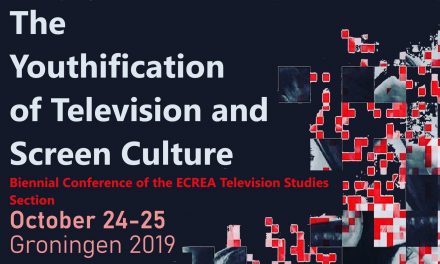In conversation with a colleague from English Literature recently, a question was posed that inspired this blog: ‘Is it ethical to charge students £9,000 in fees on the basis that a degree will get them a better job?’ I’m not sure I can answer either yes or no to this question, but it certainly provoked me to think about the various factors and contradictions at play for degrees in subjects like media, film and television, from either the ‘studies’ or the ‘production’ angle, and how this affects the future lives and careers of our graduates.
I’m sure anyone reading this is already aware of the level of student debt: last year an article in The Guardian reported that according to a recent study ‘The majority of undergraduates now at university will be paying off their student loans well into their 40s and 50s, with three-quarters of them unable to clear the debt before it is written off after 30 years’ and ‘that the average student will leave university more than £44,000 in debt’. While the 2015 HESA report on Destination of Leavers from Higher Education shows that numbers of UK university graduates from 2014 in work or study has slightly increased, and that graduate salaries are also rising, these increases are slight and destination data demonstrates that different disciplines or subject areas have different levels of success. Academics all know graduates who have managed to get jobs with high-profile employers—our success stories—but we also know those who are in retail or administration because they never achieved that dream job.
Academics in the UK are also acutely aware of the drive to emphasise employability in marketing, promoting and ‘selling’ degree courses and to produce ‘industry-ready’ graduates. Many academics in media subjects, while understanding that preparing students for employment is part of what a university education does, are concerned that the current employability agenda should not overshadow the academic rigor and pedagogic rationale of university degree courses.
Unsurprisingly, studies show that graduates in arts, humanities and creative subjects are less likely to be in employment or further study and less likely to be in ‘professional’ or ‘graduate-level’ jobs than those from STEM subjects. Media, television and film subjects straddle, at times somewhat uneasily, the creative and the industrial/ commercial, included in the ‘creative industries’ but sometimes excluded from the arts and culture sector. When students come to university, frequently saying, ‘I want to work in the media,’ they do not always have a developed awareness of what ‘working in the media’ means. Admittedly, a university degree programme can, and probably should, develop student’s sector awareness and indicate possible career paths but facilitating this kind of learning is not always easy to negotiate. It should also be noted that while students often embark on a degree with this in mind, they do not always leave with the same goal, and certainly do not always end up working in the sector. Moreover, the employability agenda is driving more and more ‘industry’ input into degree courses, yet this arguably favours the ‘production’ rather than ‘studies’ types of media degrees.
So what are the prospects for media graduates? Again, there are many familiar stories. On the plus side, the creative industries sector is growing and expanding faster than other areas of the UK economy, suggesting that more jobs are available (and offering material for university open day talks where staff are encouraged to highlight employability). Yet media jobs are notoriously competitive, and as the 2015 Report by the Warwick Commission on the Future of Cultural Value states:
There is evidence of an over-supply of graduates seeking employment in cultural and creative occupations. This encourages employers to fill administrative, support and managerial roles that do not require technical skills or specialist creative talent, with graduates who may be over-qualified for the roles they fill (p48).
There are many things we can do as teaching academics to maximise students’ employability through skills development and curriculum design aimed at increasing sector awareness. But how far can we manage expectations and provide a truly realistic picture of career paths without presenting a negative picture that many students, especially those lacking in self-confidence, will find extremely daunting?
The Creative Media Workforce Survey 2014 produced by Creative Skillset notes that ‘78% of the respondents are educated to degree level’ and that ‘This is the highest level since the survey began and also more than double the average for the wider UK working population.’ The survey also identifies an ‘increase in respondents holding a creative/media degree (51%, up from 37% in 2010 and more than doubled since 2003).’ This suggests, then, that graduates do have better chances of employment in the sector
Creative industries professionals may need to be self-employed, self-starters or freelancers, and will therefore probably have to draw on a range of skills. Some of these skills are not popular with students who see themselves as creative individuals (business skills and entrepreneurship, group work) or as practitioners (reflection, articulation and critical thinking). Managing expectations is crucial, especially given that students increasingly see themselves as consumers and demand value for money from their university education. However, prior educational experience has not always prepared today’s students for the independent learning and critical enquiry that are essential parts of Higher Education (at least in the minds of most academics and employers) and structures of testing in schools lead to instrumental attitudes to learning ‘to pass the exam’ or qualification. This is not necessarily something that can be addressed in a three year degree programme in one subject area. As the 2015 Warwick Commission report notes:
Education and skills development are essential in order to maximise our nation’s full creative and cultural potential. The key to enriching Britain is to guarantee a broad cultural education for all (through arts skills acquisition, participation in arts and cultural events and enhanced appreciation), an education and a curriculum that is infused with multi-disciplinarity, creativity and enterprise and that identifies, nurtures and trains tomorrow’s creative and cultural talent. The English education system does not provide or encourage either of these priorities and this will negatively impact not just on the future of the creative industries but on our capacity to produce creative, world-leading scientists, engineers and technologists. (p15)
In addition, there are various obstacles to university courses producing ‘industry-ready’ graduates who go on to have successful careers in media. Universities have a range of strategies to provide industry input (though ‘industry’ may be interpreted variously). One of the most popular is work placements, internships and/or work experience for students. However, opportunities for these are limited, often geographically or economically, and there is a risk of exploiting student labour. Academics and those working in the industry have differing views on the ethics of being expected to work for free when acquiring what is often termed ‘essential’ work experience. Graduates are often prepared to compromise in doing unpaid work, on the assumption that it will help them get paid employment. Yet the 2015 Warwick Commission Report observes that ‘In a recent study of respondents drawn from the Cultural and Creative Industries workforce, 91% said they had worked for free at some point in their career yet only 28% indicated that working for free had led to paid work.’ Creative Skillset’s Workforce Survey found a small decrease in the number of employees who had undertaken unpaid work experience (from 80% in 2010 to 77% in 2014) but those having done work experience before their first job rose from 37% to 41% and the number of those having done unpaid work at some point had also risen. The 2015 National Minimum Wage Low Pay Commission Report states that the NUS ‘called for us to continue to recommend strong action is taken to enforce minimum wage rules around internships and unpaid work experience, to avoid further exploitation of young workers’ yet this situation continues, despite previous recommendations that the minimum wage should apply.
It is also, unfortunately, still true that while the student body in media subjects is diverse, the workforce in the sector is much less so. Creative Skillset note that ‘7% of the workforce identified themselves as lesbian, gay or bisexual (LGB), slightly higher than the total UK population (6%)’ but women and BAME are still underrepresented, as are those declaring disabilities (5% of the workforce compared with 11% across the UK working population) and Creative Skillset also found that ‘14% of the workforce attended an independent/ fee-paying school, double the proportion of the UK population (7%)’.It is certainly difficult to know how to prepare students for this reality, without damaging their self-confidence and drive to succeed. The importance of networking is often emphasised to students on media degree programmes and Creative Skillset report that ‘56% found out about their current or most recent role through informal recruitment methods. This is a significant increase on 2010 (46%)’.
But if students and graduates do not have access to the informal networks because of gender, ethnicity, disability or social background then this knowledge will not necessarily change anything. The Warwick Commission Report notes that
The over-supply of graduates has also created a culture of unpaid internships, work placements, closed social networks and falling levels of pay which disadvantage BAME, women and students from low-income backgrounds in particular and does not promote the diversity needed for a successful creative economy (p48)

Therefore, while the Creative Industries Strategy 2013-2016, produced by the Technology Strategy Board states that
The creative industries are increasingly recognised for the wider value they bring to the UK economy as a whole. Whether in the connections between film and tourism, designer fashion and retail or architecture and construction, the creative industries have strong commercial networks and links across the economy (p8).
there is more to the value of creative industries than their contribution to the economy. There is also more to an education in television, film and media than economic prospects. The Warwick Report highlights the cultural value of the sector to the UK as a whole and further research is needed to find qualitative measures for creative industries employees. Addressing issues around unpaid work and access to jobs are important but employability, success and job satisfaction are not just about wage levels. The reports cited here are almost unanimous in recommending that a more coherent and effective strategy is needed to ensure the future of successful creative industries in the UK and higher education should play a part in this strategy. As an academic who regularly discusses these issues with colleagues inside and outside of the HE sector, I certainly agree. In the meantime, I continue to try and support my students by developing their sector awareness, as well as their critical and creative thinking as best I can.
Lorna Jowett is a Reader in Television Studies at the University of Northampton and coordinator of the Cult TV: TV Cultures Network. She is the co-author with Stacey Abbott of TV Horror: Investigating The Dark Side of the Small Screen (2013) and author of Sex and the Slayer: A Gender Studies Primer for the Buffy Fan (2005). She has published many articles on television, film and popular culture, and is currently working on a book about gender in the Doctor Who franchise.





